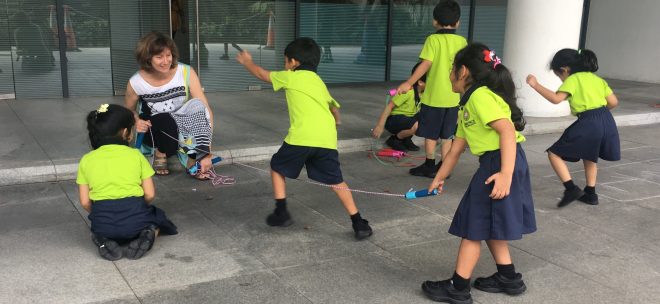Someone mentioned this and the other day, and I laughed, along with others, because it feels true so much of the time.
However, on reflection, is it the kids that suck at inquiry or should we be turning the lens back on ourselves?
We know that kids are natural born inquirers. Proven fact. They eat dirt. They ask a million questions. They stick their hands in light sockets. They take apart things. They make up imaginary trips to fairy land (all experienced first hand from my child and others).
However, as they get older and more “schooled,” they lose some of this curiosity. I love the essence of the PYP where inquiry should be at the heart of the program. In practice, it’s often a different story.
If we think our students “suck” at inquiry, it’s because we, as teachers and as admin, are doing something wrong. Here what I see as some of the driving forces of killing inquiry:
- Same learning for everyone. That even means everyone doing the same math problem in exactly the same way. Everyone writing out a reading log. Everyone doing times tables fast facts. Worksheets.
- “Unit” on inquiry. We have inquiry slotted into one part of our day as a “unit.” I know the PYP devised this term, but it allows us to separate out “inquiry” from the rest of the day. How can we truly make learning transdisciplinary and inquiry-based? Having a “unit” of inquiry allows us to be lazy.
- Strict timetabling. Hard to get away with in most schools, but it stops flow and learning and …inquiry.
- 6 units per year. In upper grades, we have to “cover” 6 units a year, which always feels rushed, and being rushed has not helped allow for inquiry.
- Planners with a forced summative task assigned at the beginning. I know that backward’s planning makes sense. However, on the rigid PYP planner, and Managebac, which forces you through the steps of the planner, you need to come up with a summative assessment before you’ve even started the unit. This ends up often as a task, which the unit focuses on and doesn’t allow for more open inquiry.
- Silence. My students are loud, and I get it. However, forced silence, hand raising and traditional classroom management practices leave the teacher front and center and not the students.
- Planning done by the teachers and admin. Lack of student voice. When students aren’t driving curriculum, planning, school expectations, outside activities, etc…they don’t care as much. They aren’t as engaged, and they’re not going to be inquiring.
What else do you think? What kills inquiry? How can we improve ourselves and our schools so that students can continue with their natural born curiosity?

This is so great! I would add that another “inquiry-squasher” is when the teacher reacts to student inquiry (conjectures, specifically) with a lot of judgmental comments (good or bad), like “Perfect.” or “Not really.” Or maintains a ‘know it all’ disposition.
Thanks for the post.
We find at our school that a barrier to their inquiry is that all the students are ELLs from only one or two different cultures. Inquiry is a slow and deep process that needs to be honored to keep the students engaged. When you have ELLs with really low English proficiency that process of inquiry becomes even slower. Then 6 weeks doesn’t seem to be enough.
Planning language and content targets to ensure students are pushed to a high standard is essential to building their skills and understandings to a rigorous level. However…when that is pushed too hard it narrows the scope of the inquiry or stops its process completely.